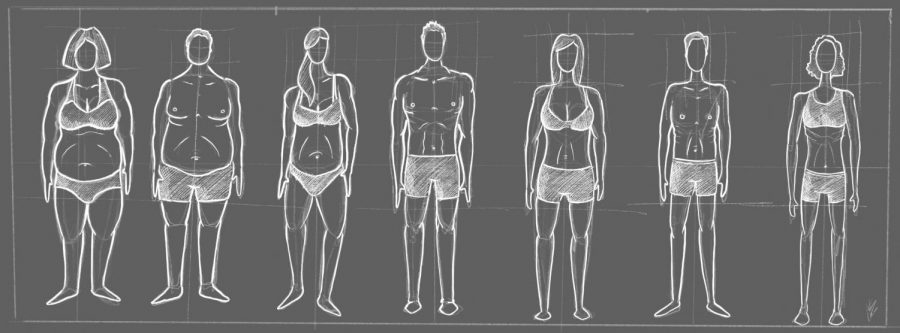People can be healthy at any weight
Health standards don’t reflect variation in body types, diet industry preys on misinformed public
NICK SANDIFER | DAILY EVERGREEN FILE
There are several definitions of what a health body looks like. Whether or not a person should respect all of these definitions is up to them.
August 28, 2018
Bodies come in all different shapes and sizes and not all bodies are the same. We see it in the differences between ourselves and others. Some of us are shorter, others taller. Some of us have brunette hair, others have black, blonde, red or any other color.
This is true of our body size too.
Bodies can be thin or fat or average or any number of types along the body spectrum. Bodies can be as healthy as another. Bodies are all equal in worth.
Body composition is not as simple as “this person is thin, therefore they are healthy” or “this person is fat, therefore they are not.”
There are several factors outside of diet and exercise that influence a person’s weight. These include, but are not limited to: genetics, race or ethnicity, environmental factors such as smoking, alcohol or medications and age, according to the U.S. Institute of Medicine Subcommittee on Military Weight Management.
Simply because a person’s body is fat does not mean they are unhealthy. There is nothing you can determine about a person’s health by their weight. There is no way to physically see all of these invisible factors that influence a person’s body size.
Erin Harrop, a doctoral student in social welfare at the University of Washington and researcher in the field of eating disorders, sums up this idea.
“You don’t know how [people in a larger body] eat, how they move, what their energy balance is, how big their bodies used to be, how ethical they are, how hard they work, how disciplined, educated, active or lazy,” Harrop said. “If you make assumptions about those things, that says more about you or our society, than it does about them.”
According to estimates by MarketResearch.com, the diet industry is currently worth $66 billion. It is built around the idea that we can fight against the body we have been given.
“By making the impossible the ideal, they’ve made customers for life,” Harrop said. “Furthermore, since the most common long-term outcome of dieting is weight gain not weight loss, they have created a problem that continues to get worse the more you try to fix it.”
And that is exactly what the diet industry is doing — profiting off of us losing and gaining weight through failed diet after failed diet because diets do not work.
Instead, we see shows like “The Biggest Loser” where contestants lose unrealistic, unhealthy amounts of weight in a short span of time. After the show ends, we do not see the consequences of these diet and exercise routines on the contestants.
In a six-year study by Erin Fothergill et al. on prior contestants of “The Biggest Loser,” a majority of the contestants regained a significant amount of lost weight back and showed slowing of their metabolism years later.
This is not about willpower. Our bodies naturally fight against weight loss.
“Bodies strive for homeostasis and stability,” Harrop said. “Bodies tend to be happy and function best when they are at their set weight, a weight that is determined by multiple things, including genetics, life stage and history of restriction.”
Similar to how we regulate our temperature, our bodies try to stay within a certain weight range. They will fight against our efforts to lose weight by lowering leptin and ghrelin and slowing our metabolism.
Our bodies do not know we are on a diet. They only know we are in a state of deprivation. That is why they go into starvation mode and fight against our weight loss attempts.
We need to change the relationship we have with our bodies. Body positivity is the idea that we can love and accept ourselves as we are in the moment.
There are some people who will say this “promotes” or “glorifies” obesity.
However, “study after study has shown that stigma is bad for health,” Harrop said. “It activates the same physiological responses as chronic stressors, and often public health campaigns based on stigma have [worse] results.”
Stigmatizing bodies is not a path to health despite what we have seen on TV shows or what we have been led to believe in the media. It is through accepting ourselves and the bodies we have that we truly find peace and health.








